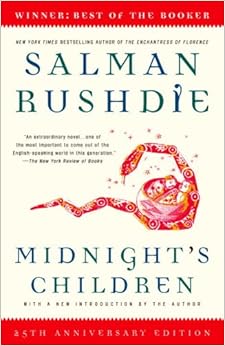
With this book, I finish all the books on the BBC Big Read that I can get through my local library system, or had already read. There are two remaining, one of which I'm getting from a friend, and one I may have to go to the inter-library loan system for. Still, this feels like the end. I'm just wrapping up loose ends.
And what a book to go out on! I am a huge Salman Rushdie fan. His prose is delicious, messy, far-ranging, and his ideas just so much fun to spend some time with. Even when it's on a fairly heavy topic, as here, where we cover the history of India from the departure of the British, through the Emergency.
It is not that Midnight's Children is opaque about its subject material, but it is not always direct in explaining, so I was grateful that I'd read Rohinton Mistry's A Fine Balance, which, while also fictional, covers some of the same events, so that I felt that I at least had the bare bones of what had gone on to clothe with this new version. The forced sterilizations, for instance.
But here I am not talking about the book itself as much as I am talking around it. I am not sure I like this book as much as The Satanic Verses, but on a scale of amazing to mind-blowing, that's not really a criticism.
Saleem Sinai is born during the midnight hour on the day of India's creation as a nation after the departure of the British. With one other, he is born closest to the stroke of midnight exactly. He thus becomes one of the leaders of Midnight's Children, the hundreds born in the new country in that hour, who have powers that are more or less powerful depending on their proximity to actual midnight. In his case, it is a form of telepathy, as well as a prodigious nose.
In the book, Saleem writes down his trip to maturity, to 31 years old, when he thinks he will die. Through that medium, it also becomes a novel of narration and how stories are told and intertwined, how personal histories intersect with national ones, and the resonances one might find, particularly if one sees oneself as the embodiment of India. Or has to fight others with the same identification.
Because of that, because of Saleem's insistence that his life echoes or causes the twists and turns of fortune in India itself, there is a sense that the narrator might not be entirely trustworthy. Or rather, that while he believes what he is writing is the truth, the conclusions he draws from the purposes of grand events might be an overreaching, a desire to have one's life have meaning when it might not.
In the middle of the book, it seems to meander. Not in such a way that made it unpleasant, but my sharp enjoyment was muted. It comes back together at the end though, through the sharpest parts of the narrative, where what happened to India happens to Saleem with brutal force.
The prose is just so good, though. It's one of the few books I've picked up in the recent past that made me want to run out and grab people and read sentences to them. (My husband suffered through that a few times.) When you find authors who can write things just so apt, so perfect, it's one of the best feelings, and Rushdie always has that in abundance.
To sum up, this is perhaps not my absolute favourite of Rushdie's books (the three others I've read), but it's really, really excellent. And I'm almost done the BBC Big Read!
In the middle of the book, it seems to meander. Not in such a way that made it unpleasant, but my sharp enjoyment was muted. It comes back together at the end though, through the sharpest parts of the narrative, where what happened to India happens to Saleem with brutal force.
The prose is just so good, though. It's one of the few books I've picked up in the recent past that made me want to run out and grab people and read sentences to them. (My husband suffered through that a few times.) When you find authors who can write things just so apt, so perfect, it's one of the best feelings, and Rushdie always has that in abundance.
To sum up, this is perhaps not my absolute favourite of Rushdie's books (the three others I've read), but it's really, really excellent. And I'm almost done the BBC Big Read!
No comments:
Post a Comment